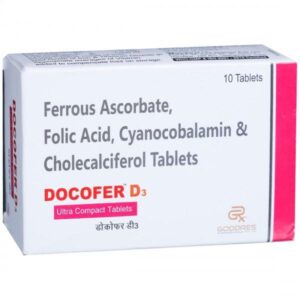IRON + CHOLECALCIFEROL + CYANOCOBALAMIN
Iron: Iron is a mineral that is essential for various biological processes in the body. It is a crucial component of hemoglobin, the protein in red blood cells that carries oxygen from the lungs to the rest of the body. Iron is primarily used as a dietary supplement to treat or prevent iron deficiency anemia, a condition characterized by low levels of red blood cells due to insufficient iron.
The mechanism of action of iron involves replenishing iron stores in the body, which allows for the production of an adequate number of healthy red blood cells. It helps stimulate the production of hemoglobin, thereby improving oxygen-carrying capacity and preventing anemia.
The recommended dose of iron varies depending on the individual’s age, sex, and specific needs. Generally, for adults, the dosage ranges from 100 to 200 mg of elemental iron per day. It is usually taken orally and can be found in different forms such as ferrous sulfate, ferrous fumarate, or ferrous gluconate.
While iron supplementation is generally safe, it can cause certain side effects. These may include gastrointestinal disturbances such as constipation, nausea, vomiting, and diarrhea. Some individuals may experience darkening of the stool, which is a harmless effect of iron therapy. In rare cases, iron supplements can lead to more severe side effects like allergic reactions, stomach ulcers, or iron poisoning.
It is important to note that iron supplements should only be taken under the guidance of a healthcare professional. They will determine the appropriate dosage and monitor iron levels to prevent iron overload, which can be toxic to the body. Iron supplements should be taken with caution in individuals with certain medical conditions such as hemochromatosis, liver disease, or chronic inflammation. Additionally, it is crucial to keep iron supplements out of reach of children, as accidental ingestion can be life-threatening.
Cholecalciferol: Cholecalciferol, also known as Vitamin D3, is a fat-soluble vitamin that is naturally present in very few foods but can be synthesized by the skin when exposed to sunlight. It is commonly used as a dietary supplement to treat or prevent Vitamin D deficiency.
The main mechanism of action of cholecalciferol is through its conversion to calcitriol, the active form of Vitamin D, in the body. Calcitriol then binds to vitamin D receptors in various tissues, including the intestines, kidneys, bones, and immune cells. This stimulates the absorption of calcium and phosphorus from the intestines, regulates calcium metabolism, and promotes bone mineralization.
The recommended daily dose of cholecalciferol varies depending on age and underlying medical conditions. For adults, a typical dose range is 400 to 800 international units (IU) per day, but higher doses may be prescribed for people with deficiency or specific medical conditions. It is important to follow the recommended dosage or as directed by a healthcare professional.
Cholecalciferol is generally considered safe when taken at recommended doses. However, excessive intake can lead to Vitamin D toxicity, which can cause symptoms such as nausea, vomiting, constipation, poor appetite, weakness, and increased thirst. Long-term excessive consumption can lead to hypercalcemia, characterized by elevated blood calcium levels, which can result in kidney stones, kidney damage, and abnormal heart rhythms.
Some individuals may experience allergic reactions to cholecalciferol. Common side effects include headache, drowsiness, muscle or joint pain, and metallic or unpleasant taste in the mouth. Rarely, high doses of Vitamin D can cause an allergic reaction, leading to symptoms like itching, rash, swelling, dizziness, and difficulty breathing.
It is important to consult with a healthcare professional before starting cholecalciferol supplementation, especially if you have an underlying medical condition, are taking medications that may interact with Vitamin D, or are pregnant or breastfeeding. They can help determine the appropriate dosage and monitor your response to treatment.
Cyanocobalamin: Cyanocobalamin is a form of vitamin B12 that is used to treat vitamin B12 deficiency. It is an essential nutrient for the formation of red blood cells, synthesis of DNA, and proper functioning of the nervous system.
Cyanocobalamin functions by converting homocysteine to methionine and by facilitating the conversion of methylmalonyl-CoA to succinyl-CoA. It is essential for the synthesis of nucleic acids, myelin, and neurotransmitters.
The dose of cyanocobalamin varies depending on the individual’s age, condition, and the severity of the deficiency. It is available in different forms such as tablets, injections, and nasal sprays. The typical dose for vitamin B12 deficiency in adults is between 250 to 1,000 micrograms per day.
Possible side effects of cyanocobalamin are generally mild and rare but may include nausea, diarrhea, headache, and itching. Rarely, allergic reactions such as swelling, rash, or difficulty breathing may occur. Serious side effects are very rare but may include chest pain, irregular heartbeat, or tingling sensation.
It is important to consult with a healthcare professional before starting cyanocobalamin to determine the appropriate dose and to ensure there are no contraindications or drug interactions with other medications.

